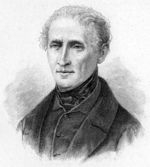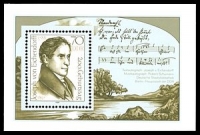| Joseph von Eichendorff | |||||
| 約瑟夫·馮·艾興多夫 | |||||
阅读艾興多爾夫 Joseph Freiherr von Eichendorff在诗海的作品!!! | |||||
艾興多爾夫是浪漫派作,他厭惡資本主義制度,對現實不滿,往舊日美好的生活,渴望返自然,他是德語文學中最優秀的詩人之一。他的詩富有民歌特色,形式質,語言明快,基調樂觀健康,與一般浪漫派詩人的朦朧、陰和神秘的詩不同。他的詩大多寫自然景色,《在一個清涼的地方》、《啊,山𠔌遙遠,山峰高高》等,都是膾炙人口的佳作。他的詩對世詩人如施托姆、李利恩竜、海塞等有很大影響。
他的長篇小說《預感和現實》(1815)是以歌德的《威廉·邁斯特》為例寫的展小說,在藝上不很成功,主要明作者反對異族侵略,以模糊不清的中世紀的理想來解决現實矛盾的思想。中篇小說《一個無用人的生涯》(1826),寫一個農少年經受不了一些近似荒唐的冒險,最化險為夷,得到意外的幸運的結局。他的“無用人”是指不附和現實生活秩序的流浪者,為爭取符人的尊嚴的生活而爭,含有深刻的意義。作品中有大量的風景描寫和優美的詩歌。中篇小說《迪蘭德宮》(1837)寫的是法國大革命,批判對貴族的過火行動,歪麯革命者的形象。此外,他還寫過劇本,如《邁耶貝特的興亡史》(1828)、《求婚者》(1833)。晚年還寫一些學著作,其中重要的有《十八世紀德國長篇小說同基督教的關係》(1851)、《戲劇史》(1854)、《德國文學史》(1857)。
Eichendorff was born at Schloß Lubowitz near Ratibor in Upper Silesia. His parents were the Prussian officer Adolf Freiherr von Eichendorf and his wife, Karoline Freiin von Kloche, who came from an aristocratic Roman Catholic family. He studied law in Halle (1805-1806) and Heidelberg (1807-1808). In 1808 he travelled through Europe, visiting Paris and Vienna. In 1810, he returned home to help his father run the family estate. The same year he met Johann Gottlieb Fichte, Achim von Arnim, Clemens Brentano, and Heinrich von Kleist in Berlin. He finished his studies in Vienna in 1812. From 1813 to 1815 he fought in the Napoleonic Wars.
From 1816, Eichendorff worked in various capacities in the administrative service of the Prussian state. In 1821, Eichendorff became school inspector in Danzig, in 1824 Oberpräsidialrat in Königsberg. He moved with his family to Berlin in 1831, where he worked for several ministries, until he retired in 1844. Eichendorff died in Neiße, Upper Silesia, in 1857.
Despite a career of rather mundane officialdom, Eichendorff is considered the greatest of the German Romantic lyric poets. His guiding poetic theme was that Man should find happiness in full absorption of the beauties and changing moods of Nature. He also wrote a history of German literature that was posthumously published. Eichendorff's poetry been set by many composers, including Schumann, Mendelssohn, Brahms, Hugo Wolf, Richard Strauss, Friedrich Nietzsche, Hans Pfitzner, and Alexander Zemlinsky.
Aus dem Leben eines Taugenichts – Eichendorff's masterpiece
English title: Life of a Good-For-Nothing.
A typical romantic novella, voyage and love are the main topics. The protagonist leaves his father's mill and becomes gardener on a Viennese castle and falls in love with the supposed daughter of the duke. Because she is unreacheable for him he travels to Italy but then returns and gets to know that she is just adopted by the duke and nothing stands in the way of a marriage between them.
Important works
Stamp of him from the GDR1808 – Die Zauberei im Herbst
1808–1810 – Oberschlesische Märchen und Sagen (Upper Silesian fairytales and sagas)
1815 – Ahnung und Gegenwart
1819 – Das Marmorbild (The Marble Statue)
1826 – Aus dem Leben eines Taugenichts (Life of a Good-For-Nothing)
1833 – Dichter und ihre Gesellen
1833 – Viel Lärmen um nichts
1834 (or 1838) – Auch ich war in Arkadien
1835 – Die Meerfahrt
1837 – Das Schloß Dürande
1839 – Die Entführung
1841 – Die Glücksritter
Geschichte der poetischen Literatur Deutschlands (published 1857)
Libertas und ihre Freier
Notes
Regarding personal names: Freiherr is a title, translated as Baron, not a first or middle name. The female forms are Freifrau and Freiin.

